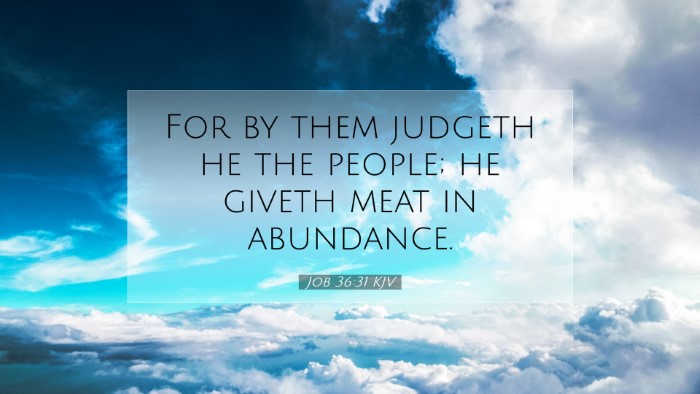Commentary on Job 36:31
Verse Context: In Job 36:31, Elihu is making a profound declaration concerning God's sovereignty over the universe, particularly in the realms of providence and judgment. This verse reads: "For by them judgeth he the people; he giveth meat in abundance." This succinct yet powerful statement encapsulates the overarching theme of God's authority and His involvement in human affairs.
Commentary Overview
Various public domain commentaries provide rich insights into this verse, focusing on different aspects such as divine judgment, providence, and sustenance. The commentaries by Matthew Henry, Albert Barnes, and Adam Clarke contextualize Elihu's claims within the broader narrative of Job.
Divine Judgment
Matthew Henry's Insight: According to Matthew Henry, Elihu's assertion reflects the judicial character of God. "For by them judgeth he the people" can be seen as an affirmation that God governs the moral order through His justice. Henry emphasizes that God's judgments are not arbitrary; rather, they are just and based on divine wisdom. God’s governance ensures that justice prevails, even when human understanding seems clouded.
Albert Barnes' Perspective: Barnes elaborates on the notion of divine judgment. He notes that God's judgments are manifest in the natural world and within human history. The phrase concerning God’s judgment suggests that God’s control extends beyond mere punishment; it is also a corrective force leading people towards righteousness. God's authority is intrinsic to the order of creation.
God's Providence
Adam Clarke's Commentary: Clarke brings attention to the idea of providence associated with the phrase "he giveth meat in abundance." He interprets this as God's provision for His creation, reflecting His benevolence and care. Clarke posits that this provision is not just physical sustenance but extends to spiritual nourishment, which is vital for the well-being of humanity. Clarke suggests that the abundance mentioned here reveals God’s desire to bless His people abundantly.
Henry's Views on Providence: Matthew Henry aligns with Clarke's interpretation by emphasizing that God's provisions are abundant and tailored to meet the needs of His people. Henry argues that God’s provision is integral to understanding His nature as a loving Father. His abundant provision reflects not only His generosity but also His concern for the spiritual and physical well-being of humanity.
Theological Implications
- Sovereignty of God: Both Henry and Barnes affirm the sovereignty of God, indicating that every event in the universe, including judgment and provision, occurs under divine authority. This sovereignty implies that all actions ultimately serve God’s purposes.
- Human Responsibility: Clarke raises a question regarding human responsibility in response to God’s judgments and provisions. He suggests that while God provides abundantly, it is essential for human beings to recognize and respond appropriately to His gifts.
- Role of Suffering: Within the larger context of Job, Elihu’s speech is a counterpoint to Job’s laments over his suffering. This verse reminds readers that even in suffering, God’s judgments and providence are at work—a theme explored deeply in Job's trials.
Practical Applications
The insights from these commentaries can be tightly woven into the fabric of pastoral care and theological education.
- Encouragement during Trials: Pastors can use this verse to remind congregants of God's active involvement in their lives, especially during difficult times. Assuring them that God’s purposes are always fulfilled, they can find comfort in God’s providence.
- Teaching on God's Character: Teachers and scholars can use this passage to discuss the attributes of God, particularly His wisdom and justice. Understanding God’s character is crucial for students studying theology, leading them to a more profound relationship with God.
- Application of Divine Justice: The church is called to uphold and promote justice in society based on the understanding that God's judgments reflect unerring justice. This can foster discussions on ethical living and societal responsibility.
Conclusion
Job 36:31 encapsulates the essence of who God is—just, sovereign, and providential. The insights from Matthew Henry, Albert Barnes, and Adam Clarke serve as a robust foundation for understanding the intersection of divine judgment and providence. For pastors, students, theologians, and Bible scholars, this verse offers rich material for reflection, teaching, and application, guiding them as they explore the depths of Scripture and its relevance to everyday life.


